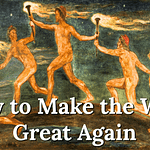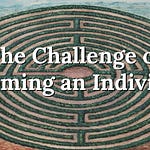“Not all those who wander are lost.”
J.R.R. Tolkien, The Fellowship of the Ring
We are often told that big goals are the cornerstone of a meaningful and successful life and that without them, we’ll drift aimlessly and achieve nothing of great worth. But what if this idea is mistaken? What if, in our quest to do something great, it is the very act of setting big goals that leads us astray? In this video, drawing from Kenneth Stanley and Joel Lehman’s book Why Greatness Cannot Be Planned, we explore why achieving greatness often requires that we abandon our big goals and embrace a life of uncertainty and open-ended exploration.
Before we begin, we should emphasize that not all goals are harmful. Small and modest goals, such as losing 10 pounds, learning a new language, or getting a job, are effective means to better our life. Modest goals are effective drivers of change because the path to their achievement is clear and with discipline and a hard work we can reach them. But big goals are different. When we set ourselves a goal such as to make tens of millions of dollars, win a Nobel prize, write a bestselling novel or a chart-topping album we face a paradox: the more ambitious the objective, the less clear the path — and the more likely the goal will lead us astray. Or as Stanley and Lehman write:
“Objectives, [i.e., goals] are well and good when they are sufficiently modest, but things get a lot more complicated when they’re more ambitious. In fact, objectives actually become obstacles towards more exciting achievements, like those involving discovery, creativity, invention, or innovation – or even achieving true happiness… the greatest achievements become less likely when they are made objectives… the best way to achieve greatness… is to have no objective at all…Why would this be? The key problem is that the stepping stones that lead to ambitious objectives tend to be pretty strange. That is, they probably aren’t what you would predict if you were thinking only of your objective.”
Kenneth O. Stanley and Joel Lehman, Why Greatness Cannot Be Planned
Truly great achievements, in other words, often arise from seizing opportunities that seem unrelated to the end accomplishment and it is only with hindsight that their importance in driving us to this end becomes clear. For example, Alexander Fleming didn’t set a goal to discover antibiotics; he stumbled upon penicillin after noticing a strange mold in a petri dish. Art Fry and Spencer Silver didn’t aim to create the Post-it Note, this widely successful invention was the product of a failed attempt to develop a strong adhesive. And Steve Jobs’ chance encounter with a calligraphy class, taken on a whim, later shaped the defining aesthetics of the Macintosh computer — a connection he did not foresee at the time. Or as Jobs said:
“. . . if I had never dropped in on that calligraphy class, then personal computers might not have the wonderful typography that they do. Of course it was impossible to connect the dots looking forward when I was in college, but it was very, very clear looking backwards.”
Steve Jobs, Stanford University Commencement Speech 2005
Setting big goals also comes with a psychological cost. For when we aim at something overly ambitious, we stake our identity on an outcome that often depends on lucky breaks, serendipitous encounters and factors out of our control. Unless we are already close to realizing such a feat, the gap between where we are now and where we hope to be is so large that it becomes a source of chronic frustration. Many who set wildly ambitious goals succumb to what the Danish philosopher Søren Kierkegaard called the “Caesar or nothing” mentality, which is the belief that anything short of total triumph renders life meaningless.
“…when the ambitious man whose slogan is ‘Either Caesar or nothing’ does not get to be Caesar, he despairs over it. But this also means something else: precisely because he did not get to be Caesar, he now cannot bear to be himself.”
Søren Kierkegaard, The Sickness Unto Death










